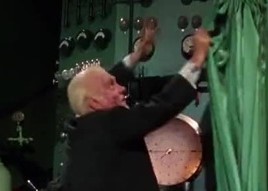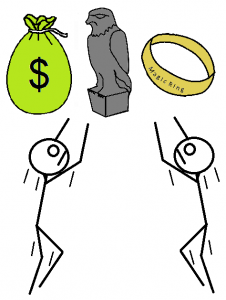Until recently, I had been a writer like you, churning out stories and submitting them before Oz, the Great and Powerful…er, I mean editors.
I just co-edited a book myself for the first time and I learned a few things. Today, I’ll pull back the curtain and show you what I found out. Some editors might tell you to pay no attention to the mere mortal behind that curtain, but not me. Perhaps the following nuggets of wisdom will help you as you write and submit stories.

- Get away from your gender planet. I’ll try to put this delicately. In 2020, I assumed women weren’t from Venus anymore and men weren’t from Mars. That is, I assumed female writers had gotten beyond long descriptions of characters’ apparel and deep explorations of relationships with no real plotline. Likewise, male writers were well past stories filled with violence and action, peopled with stereotype characters who speak in monosyllables. I thought we’d transcended all that. Nope. Without looking at a writer’s name, I could generally tell the gender in the first couple of paragraphs. My advice—bend your writing toward the other gender’s planet.
- Don’t expect your poorly written good idea to sell. Occasionally, we’d get a story with a wonderful premise, engaging plotline, and compelling characters, and we’d really want to accept it. Unfortunately, the work suffered from grammar mistakes, plot holes, anachronisms, and other problems. As editors, we’d have to weigh the time required for thorough editing, as well as the back-and-forth communication with the writer, against the idea of accepting a different story that was almost as good but had far fewer mistakes. Self-edit your story with care before submission.
- Don’t throw junk at the wall. If the submission guidelines state the editors are looking for stories inspired by Jules Verne’s Twenty Thousand Leagues Under the Sea, send a story like that. We received more than one story way, way outside those bounds. As a new editor, I read every submission all the way through. For some, I kept hoping as I read that there’d be some connection, some reference, some link to Verne or submarines, but no. What a waste of the writer’s time, not to mention mine.
- Learn to write a cover letter. Luckily, there’s not much to learn. If the submission guidelines tell you what the editor wants in your cover letter, follow those. If not, here are my guidelines: (a) No spelling or grammar mistakes. If you can’t get the cover letter right, the editor will have little hope for your story. (b) Just include relevant facts about yourself, things that connect to your story. If you’re sending fiction, don’t list your non-fiction and poetry credits. If you have no relevant credentials yet, don’t stretch what you have to fit. (c) Shorter is better, by far. If your cover letter bores an editor, there’s little hope for your story. If you can get away with no cover letter at all, do that. If all you say is “Please consider my story, ‘<title>’ for your anthology,” that’s fine too.
- Follow submission guidelines. Sure, it stinks that every editor has her own filename structure, font rules, quote mark guidance, page formatting, etc. Yes, it would be easier if they all agreed on the same submission process. We don’t live in that world yet. Just read and follow each editor’s rules. Better that than to give the editor a good reason to reject your story.
- Understand that rejections aren’t only hard on the writer. Boy, I hated having my stories rejected, until I learned to get over it and keep submitting. But it’s actually worse from the editorial side. Several stories were on the borderline, really close to getting accepted for our anthology. It broke my heart to reject them. Not much advice here, but just realize that you’ll never know how difficult it was for an editor to reject your submission. Even if they tell you, it won’t help much. Just pick yourself up and submit that story elsewhere.
- Aim for a smooth author-editor relationship. After acceptance, be positive and professional in all your communication with the editor. If an editor recommends changes to your story, consider them dispassionately before exploding. You can push back against changes where you disagree, but explain your reasoning when you do. In the mission of making your story the best it can be, you and the editor are on the same team.
- Help with marketing. If your story is accepted by a small press, understand that they won’t have a marketing team. They’ll appreciate any advertising help you can provide, including promoting the anthology on social media, interviewing the other authors on your blog or having them guest-post, and posting a review of the anthology.
Now that I’ve given you a peek behind the curtain, you’ve got the brains, heart, and courage to find a good home for your story. All granted by that great and powerful wizard—
Poseidon’s Scribe

 Simply put, a MacGuffin is the protagonist’s goal. It can also be the goal of the antagonist as well. Perhaps they’re both pursuing it, or seeking to prevent the other from having it. It can be a tangible object, or an abstract idea.
Simply put, a MacGuffin is the protagonist’s goal. It can also be the goal of the antagonist as well. Perhaps they’re both pursuing it, or seeking to prevent the other from having it. It can be a tangible object, or an abstract idea.